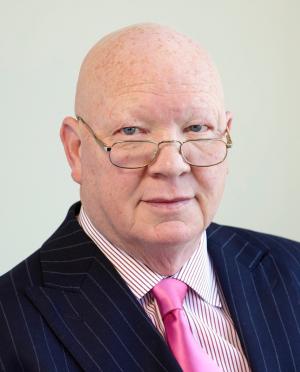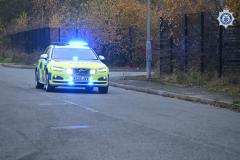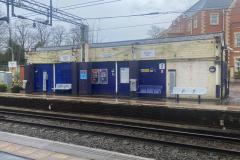
Cheshire East Council have announced a one-year postponement of any decision on the future of subsidised home-to-school transport for faith schools and post-16 pupils.
At Monday's Cabinet meeting, Councillor Hilda Gaddum proposed an option to withdraw transport to faith primary and secondaries to new pupils from September 2012, withdraw post-16 transport for new pupils from September 2012 and increase the parental contribution for denominational transport by five per cent from £299 to £314 per year.
The proposal from the Cabinet member with responsibility for children and family services was seconded by Council Leader Councillor Wesley Fitzgerald.
However, as a result of members of the public and visiting councillors speaking out against the plans, Councillor Fitzgerald announced an unusual step and adjourned the meeting for five minutes to consult with Councillor Gaddum and director of children and family services Lorraine Butcher.
On his return, Councillor Fitzgerald announced the postponement of part of the decision relating to the withdrawal of transport but said: "We will be implementing the five per cent charge on the subsidy. That will be effective from September 2011.
"This means that parents will contribute £314 from September, instead of the current £299. This reflects the current rate of five per cent inflation."
Councillor Hilda Gaddum withdrew her original proposal and the packed meeting broke out into spontaneous applause.
After the meeting Councillor Gaddum said: "This consultation, I know, has been challenging and difficult and I would like to thank all those who have taken the time to contribute.
"Throughout the consultation period, I have listened to and considered carefully all the concerns that have been raised.
"I would particularly like to thank those who took time to attend the Cabinet meeting today, at which, in response to the views expressed and the points raised, we agreed to pause for one year to consider a difficult task even further.
"I hope that the outcome of today's meeting demonstrates clearly that we do listen to all views. I very much hope that the further work that will be undertaken will lead to a positive outcome."
Councillor Frank Keegan said "The decision to defer this transport decision is really welcome. It is a victory for common sense, and is a great victory for people power.
"In hindsight, we might come to reflect that the big society has started. The public turned up to Scrutiny meetings, they made their feelings known and the Cabinet proposal which was seconded by the Leader had to be withdrawn. As the Leader said in the meeting, this is the first time Cabinet has had to change its mind actually in a meeting. I think that is very much the future for local Government.
"The Prime Minister has made it possible for the public to keep a track of Council spending over £500 and gradually, the public will be more aware of the power which the Prime Minister has given them. We have exciting times ahead."
The proposals put before Cabinet followed unprecedented financial challenges facing councils. Cheshire East Council needs to find savings of about £50m over the next few years, as a consequence, the budget for Home to School Transport is being reviewed and the Children and Families Directorate is expected to find savings from it of approximately £1m over forthcoming years.
In 2010/11 the cost to the Council of providing transport to faith schools was on average £1097 per pupil. The Council currently charges parents £299 per child, a second child from the same household at the same rate and all other children travel free. There are currently 685 pupils, which represents 1.37% of the 5-16 school population, who receive subsidised school transport at a net cost to the Council of £512,000.
There are currently 1003, 16-19 students receiving subsidised transport to colleges or sixth forms attached to mainstream schools.







Comments
Here's what readers have had to say so far. Why not add your thoughts below.
The Cabinet's proposals to withdraw the special subsidies for faith schools, after consultation, was surely right. It is a pity they caved in when pressed by a vociferous minority.
Your rationale is not entirely accurate. When the Butler Education Act came in, 1944, Churches had the choice : take 100% funding but give up the right to religious education or take 50% funding (the churches paid the other 50%) but they kept religious education.
Besides the 50%, the land is owned by the Church.
Faith school pupils pay for their travel; eg from Middlewich to Northwich, they pay £314 to the Council. The bus service charges £306. COUNCIL charges £1,097, which is 3.5 times what Arriva charge.
Instead of complaining, why don't you campaign to find out why Council transport is so expensive? This same overcharging applies in Social Services for Children and for Adults. How many services will be closed in the name of savings, when clearly there are many overheads being recovered now. If services stop now, the overheads will still be there. Why not just get rid of the overheads, and stop worrying about faith schools who are paying their full fare (Arriva) and yet they own the land, and pay towards the running costs!
Why should Faith Schools subsidise all secular schools who get the same subsidy?
P.S. - the consultation was flawed. It did not last the statutory number of
days, it did not consult all of the people affected and it did not send out
letters to the 2,000 affected by the withdrawal of services. Council says
2,000 letters would have cost £50,000, and yet Middlewich (most affected
area) received 3 letters to 10,500 people re silver bins, ie 31,500 letters
or nearly £800,000 if you believe £50,000 for 2,000 letters!
Thanks for your reply.
Perhaps you are confusing a number of issues a little. The settlement based on the 1944 Act was between the state and faith schools - it was not about a privilege for parents to receive a special treatment with regards to transport.
The high cost the Council pays to provide the transport may indeed need looking at - but is not strictly relevant to the issue here.
My underlying concern is that faith schools argue for special treatment so that they can continue to draw pupils from all over the Borough, effectively segregating them from their local community and into a doctrinaire environment. While the last government (and to an extent the current one) was so enthusiastic about faith schools that it backed the establishment of new schools including Islamic, Sikh, Seventh Day Adventist and Jewish schools, the majority of the population oppose the state's backing for faith schools and the divisive potential they represent.
As Rabbi Jonathan Romain wrote in the Times: 'We have spent more than a century ridding ourselves of class divisions; why now rush to replace them with religious barriers?'
Faith Schools don't argue for special treatment; they want the contract that was entered into to be maintained.
You MISS the point that faith school pupils pay for their transport to school - despite the fact that the original deal was free transport. Cheshire East wanted to withdraw that transport because of the costs they incur - but as I pointed out before, the pupils pay slightly more than Arriva charge for the same journey. Cheshire East costs 3.5 times more than Arriva charges.
Arriva does not put on enough buses, so all Cheshire East has to do is persuade Arriva to run more buses, to cover both the employed and the school pupils.
Each Secondary school has feeder schools - Wilmslow High, for example, will have a range of feeder schools and they will have a pecking order. St Benedict's in Handforth is a feeder school for All Hallows in Macclesfield; you are arguing that the pupils should go to Wilmslow, but it would take years to build "feeder/main" relationships and in that time whole hosts of pupils would be disadvantaged. Why?